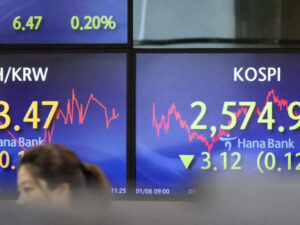Chinese stock markets experienced a significant surge on Tuesday, marking their most substantial rally in years, following an announcement from the country’s sovereign wealth fund regarding plans to increase stock purchases. This move comes as officials aim to stabilize the market after enduring a three-year downturn.
The Shanghai Composite, which serves as mainland China’s primary index for large state-owned enterprises and blue-chip stocks, closed with a 3.2% gain on Tuesday, breaking a six-day losing streak. This uptick represents the largest daily increase since March 2022.

Meanwhile, smaller companies saw even more impressive gains, with the Shenzhen Component Index rising by 6.2%. This performance marks the index’s most significant daily surge since September 2015, while the ChiNext startup index recorded its best performance in seven years, soaring by 6.7%.
In Hong Kong, the Hang Seng Index witnessed a robust 4% surge, marking its most substantial percentage gain in over six months. Notably, Chinese tech stocks led the charge, with Alibaba Group (BABA) experiencing a 7.6% increase ahead of its upcoming earnings announcement on Wednesday.

The market rebound follows heightened efforts from Chinese authorities to support the struggling stock market, which faced a challenging 2023 and has continued to underperform this year, ranking as the world’s worst-performing market so far.
Central Huijin Investment, the equity arm of China Investment Corp, revealed on Tuesday that it had recently expanded its holdings of exchange-traded funds (ETFs) on mainland stock markets. The institution stated its commitment to increasing and diversifying its holdings to ensure the stable operation of the capital market.
In response to this initiative, the China Securities Regulatory Commission expressed firm support for Central Huijin Investment’s plans to boost its holdings. Additionally, the regulator announced its intention to encourage more institutional investors, such as mutual funds, state pension funds, and insurers, to enter the stock market.
Despite the positive developments in the Chinese market, other regional markets saw declines on Tuesday. Japan’s Nikkei and South Korea’s Kospi closed down by 0.5% and 0.6%, respectively, while Australia’s S&P/ASX 200 also experienced a 0.6% loss.
While Beijing’s intensified efforts may have provided temporary relief for Chinese stocks, they do not address the underlying economic challenges, including weak demand, deflationary pressures, a struggling real estate sector, and escalating trade tensions with the United States.
















































